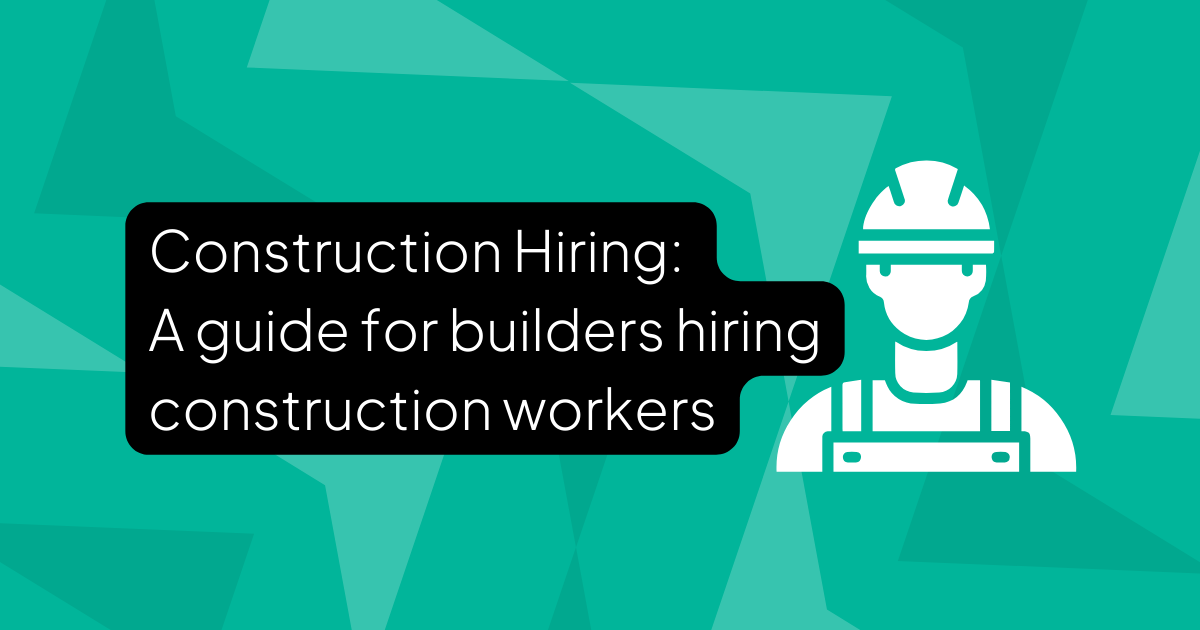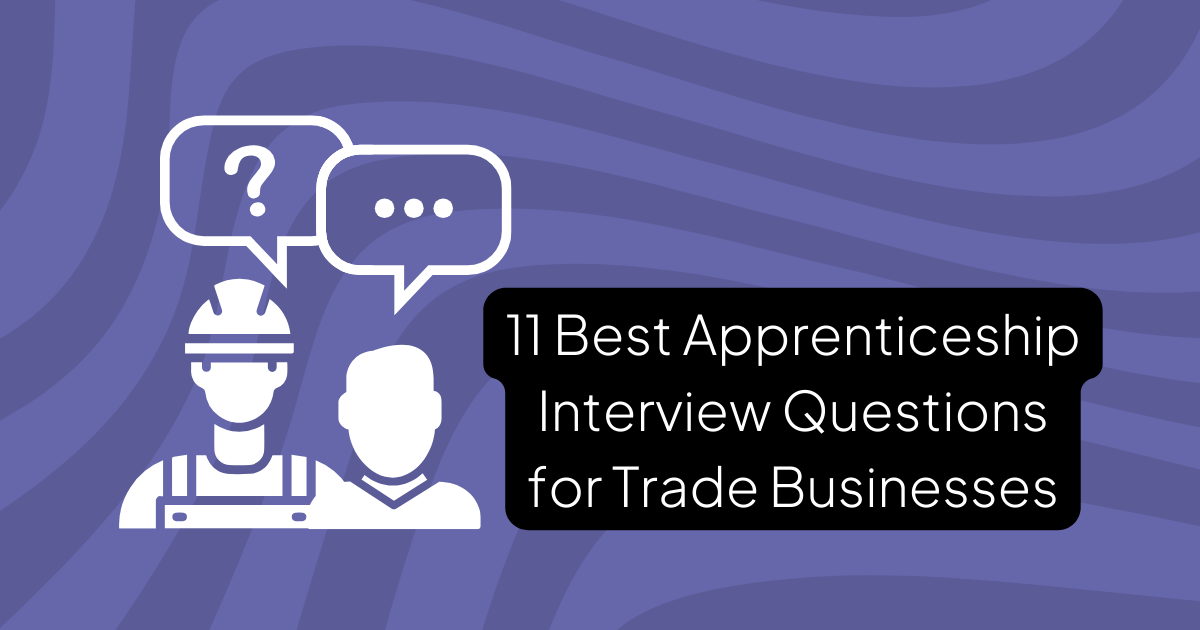
Need to expand your team? Well first up, congratulations! It's a significant milestone for your business growth. Secondly, we want to have a little chat about the process, because we know how tempting it can be to cut a few corners to get your team running at full strength ASAP. But word to the wise, if you don’t hire the right candidate, your team will never be running at full strength. So, we’ve got some tips to make the hiring process as simple as possible.
Tips Before Starting the Interview
It all comes down to the interview because that’s your shot to get to know as much about your candidates as you can. In this guide, we've curated 40 HVAC interview questions to help you identify the best fit for your team. But before diving into the HVAC interview questions, let's discuss some essential tips to ensure your interview process runs smoothly.
Know who you’re interviewing
- Review the resume and application: thoroughly examine the candidate's resume and application to understand their background and work experience.
- Research past work experiences: understand their background by researching their past work experiences and the companies they have worked for. This will provide insights into their career trajectory and industry exposure.
- Review certifications and licensing: make sure that the candidate has any required certifications or licenses for the HVAC work you specialise in.
Prepare questions
- Technical questions: develop a set of technical HVAC interview questions (don’t worry, we can help with that!) to assess the candidate's knowledge and expertise in HVAC systems, covering topics such as troubleshooting, system installation, maintenance, and repair. This might not be so relevant with an apprenticeship candidate.
- Behavioural questions: prepare behavioural questions to evaluate how candidates have handled situations in the past, providing insights into their problem-solving skills, communication abilities, and ability to work under pressure.
- Problem-solving scenarios: develop hypothetical HVAC-related scenarios and inquire about the candidate's approach to problem-solving, evaluating their critical thinking skills.
Be clear about things you need your candidates to know
- The job requirements: clearly define the specific skills and qualifications required for the HVAC position, including technical skills, system knowledge, and troubleshooting abilities.
- Safety awareness: emphasise the importance of safety in HVAC work and inquire about the candidate's commitment to safety protocols, knowledge of regulations, and approach to maintaining a safe work environment.
- Customer service skills: assess the candidate's customer service skills, communication abilities, and approach to handling client concerns or complaints. Ensure they are well aware of the importance of customer satisfaction in your business.
HVAC Interview Questions
20 Introductory HVAC Interview Questions and Why You Should Ask Them:
1. What motivated you to pursue a career in HVAC and apply for this role?
This question is fantastic because it allows the candidate to share their personal journey and passion for HVAC so you can understand their genuine interest and connection to the field.
2. Can you discuss your previous experiences with HVAC system repairs?
This question lets candidates share their unique experiences and stories, giving you valuable insights into their practical knowledge and problem-solving abilities in HVAC system repairs.
3. Could you elaborate on your formal training or education in HVAC systems?
While on-the-job learning is crucial in trades, you’ll need to be sure they have a strong educational background too - it’ll tell you how well-prepared they are for the technical aspects of the job.
4. Describe a significant career challenge you've encountered and how you overcame it.
Candidates appreciate this question because it lets them show not only their professional resilience but also their problem-solving skills.
5. In terms of career progression, where do you see yourself in the next five years?
So, when you throw in this question, it's not just about predicting the future; it’s a clever way for you to gauge their aspirations and check that they align with the long-term goals of your company, all while keeping things friendly and open.
6. How do you handle conflict situations in the workplace?
You're really getting a peek into their approach to tricky situations with this one, giving you a feel for how they keep the team ship sailing smoothly.
7. What has prompted your search for a new employment opportunity?
This question tells you about their career goals and lets you assess how well the position aligns with their objectives.
8. For this position, what are your salary expectations?
Chatting openly about salary helps make sure both the candidate and your company are on the same page budget-wise.
9. What hours are you available to work, and do you have preferred working times?
Asking this helps you figure out if the candidate is willing to work within your schedule.
10. How do you keep yourself informed about the latest trends in HVAC technology?
When you ask candidates how they keep themselves in the loop about the newest HVAC technology, you're not just finding out if they're up to date – you also get an idea about their commitment to staying on the cutting edge.
11. What characteristics do you value in a supervisor or team leader?
This question helps you understand what leadership style the candidate prefers. By asking about the qualities they value in a supervisor or team leader, you can learn more about their ideal work environment and the type of management that brings out their best performance. It's a practical way to assess if their preferences align with your team's culture and leadership style.
12. Are there any additional technical skills or qualifications you possess that we should be aware of?
This question lets the job candidates showcase any technical skills or qualifications they may have, which gives you a full overview of their capabilities. Could potentially reveal hidden talents that might benefit your team.
13. Do you hold a valid driver’s license?
Self-explanatory one here - can they get themselves to job sites? Will they be able to pop out to the local hardware store for supplies? You can certainly make it work if your candidate doesn’t drive, but you really need to know before you hire so you can make plans.
14. What initially attracted you to the field of HVAC?
This question helps reveal their unique motivations and genuine enthusiasm for entering the HVAC field. It creates a more personal connection and understanding of their career journey.
15. Share some valuable insights or lessons you've gained from your experience in maintenance.
Discussing insights gained from their maintenance experience not only provides a window into the candidate's practical skills and problem-solving abilities but also lets you to gauge their depth of knowledge and passion for the field.
16. What would you say are your strongest attributes?
Throwing this question out there about candidates' top strengths lets you see how well they know themselves. It makes the interview chat more real and constructive.
17. Can you identify any areas of improvement or weaknesses in your professional skills?
Asking this question lets candidates show how they see themselves and if they're up for growing. It's a good way to figure out if they're into reflecting on their career journey and committed to getting even better.
18. In your opinion, what traits are crucial for someone in the HVAC technician role?
When you ask candidates about the crucial traits of an HVAC technician role, you allow them to showcase their understanding of the position and demonstrate how well they align with the key qualities sought.
19. Explain why HVAC systems are critical in business operations.
When candidates talk about why HVAC systems matter, they're not just showing tech skills. They're also proving they can link technical stuff to the bigger business picture, making it easier for you to check their skills and awareness.
20. Recall a time when your work received commendation or positive feedback.
You're really giving them the chance to showcase their achievements and strengths, making the interview process a more engaging and insightful experience for both you and the interviewee.
In-Depth HVAC Interview Questions
These might not be appropriate for an apprentice just starting out there career. But if you’re looking for a seasoned pro, your candidate should have some great answers to these HVAC interview questions. Let's dive even deeper with more detailed questions for your interview.
21. Can you provide a step-by-step breakdown of a particularly complex HVAC installation or repair project you've undertaken, including the specific models or systems involved and the innovative solutions you implemented?
22. Given the increasing focus on environmentally friendly refrigerants and stringent regulations, can you discuss a specific instance where you had to transition to a new refrigerant or adapt your practices to comply with changing environmental standards?
23. Describe a time when you conducted a comprehensive energy audit for an HVAC system. What specific measures did you recommend or implement to enhance energy efficiency, and what measurable impact did these changes have?
24. Provide an example of a situation where you not only met but exceeded customer expectations. How did you communicate complex HVAC issues in a way that the customer could understand, and what feedback did you receive?
25. Delve into the details of your commitment to safety. Can you share an instance where you identified a potential safety hazard, implemented corrective measures, and ensured ongoing adherence to safety protocols among your team?
26. Walk me through a particularly challenging troubleshooting scenario. How did you diagnose the issue, and what methodologies or diagnostic tools did you employ to pinpoint and rectify the problem?
27. Provide examples of how you've integrated advanced technologies, such as smart HVAC systems or IoT devices, into your work. How did these technologies enhance system performance, monitoring, or maintenance efficiency?
28. Discuss a project where effective collaboration was essential. How did you contribute to a cohesive team dynamic, resolve conflicts if any arose, and ensure that project goals were achieved efficiently?
29. In terms of ongoing learning, can you share specific instances where you pursued advanced certifications or attended specialized workshops? How have these learning experiences directly benefited your work in HVAC?
30. Provide a detailed breakdown of your preventive maintenance approach. How do you determine the optimal frequency for maintenance tasks, and can you share a case where proactive maintenance prevented a major system failure or downtime?
These HVAC interview questions aim to extract detailed responses from the candidate, offering insights not only into their technical expertise but also into their problem-solving strategies, customer-centric approach, and ability to adapt to industry advancements. Feel free to adapt these HVAC interview questions based on the specific requirements of your HVAC position.
Experience and Situational HVAC Interview Questions
When hiring an HVAC professional, asking about their experiences and how they handle real-world situations is key. Experience HVAC interview questions give insights into their past wins and challenges, while situational questions help you understand their problem-solving skills. This combo ensures you find someone not just skilled technically but also great at thinking on their feet. It makes the interview more fun and helps pick the perfect fit for the job!
31. Can you discuss your proficiency with various HVAC tools?
32. Which HVAC brands have you worked with, and how extensive is your experience with each?
33. Share details about your HVAC repairs and maintenance background, highlighting specific experiences and skills.
34. Describe your relevant experience aligning with the requirements of this HVAC position.
35. What are a few valuable lessons you've learned from your experiences in HVAC maintenance?
36. If a customer is concerned about repair costs, what steps would you take to address and alleviate their worries?
37. How do you handle client concerns regarding energy efficiency and consumption in HVAC systems?
38. Have you used mobile technology for HVAC maintenance tasks, and can you provide examples of its benefits?
39. What strategies do you use to stay motivated and engaged in your role as an HVAC technician?
40. Share the qualities that you believe distinguish you as the best candidate for this HVAC position.
When it doesn’t feel right
When you know, you know. But if you can’t put your thumb on why not, here are some signs that might help you understand why your candidate might not be the right fit.
No hands-on experience
If the candidate isn't familiar with the basics of HVAC systems, like their components or common troubleshooting practices, it might mean they need more hands-on experience.
Trouble talking about past projects
If someone looks great on paper but can't chat about specific HVAC projects they've tackled before, let's face it - they might be stretching the truth on their resume.
Bringing negativity to the table
A negative or dismissive attitude can spill over into poor communication skills. If they struggle to explain past experiences or articulate thoughts clearly, it might be a red flag.
Not open to learning
HVAC pros should be up for learning new stuff. If someone's not keen on expanding their skill set, it could be a sign of a less-than-positive attitude.
Missing the mark on professionalism
Being fashionably late or not doing their homework on the company? It might suggest a lack of professionalism and commitment to the role.
Customer service hiccups
Trouble explaining how they handle customer concerns? It might hint at a lack of customer service skills, a big deal in many HVAC gigs.
Safety first... or not?
If they don't grasp the importance of safety in HVAC work or toss safety protocols aside during the interview, it's a red flag for their on-the-job safety approach.
Team player or solo act?
Can't share examples of teamwork or collaboration? It might be a sign they struggle in a team-oriented environment.
Problem-solving puzzles
If they're not acing hypothetical HVAC scenarios with effective solutions, their problem-solving game might need a boost.
Fuzzy career goals
If a candidate can't map out clear career goals or seems unsure about their professional path, they might not be fully committed to the HVAC field.
As you go through the interview process, keep an eye out for these cues and throw in some insightful HVAC questions. It'll help you figure out if a candidate has the right qualities and experiences for your HVAC team. Don't forget, it's not just about technical know-how; you’re also looking for those skills, professionalism, and a positive attitude to make sure they're a perfect fit for the role.
Ready to Hire Your Next Expert?
Finding the right HVAC technician for your team involves a lot of thought and preparation, but that’s ok. You know how vital your team members are to your business, so it’s worth putting in the work to find the right one. Each candidate is a potential asset to your team, and a thorough interview process is the key to unlocking their full potential. Happy hiring!







